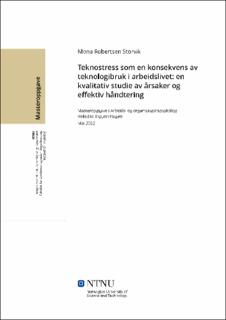| dc.contributor.advisor | Hagen, Ingunn | |
| dc.contributor.author | Storvik, Mona Robertsen | |
| dc.date.accessioned | 2022-06-30T17:20:19Z | |
| dc.date.available | 2022-06-30T17:20:19Z | |
| dc.date.issued | 2022 | |
| dc.identifier | no.ntnu:inspera:109732702:33376559 | |
| dc.identifier.uri | https://hdl.handle.net/11250/3001884 | |
| dc.description.abstract | I dagens samfunn ser vi et arbeidsliv i rask endring, der ny teknologi endrer premissene i arbeidsmiljøet og preger måten vi jobber på. Teknologi er hovedsakelig ment å gjøre arbeid enklere og mer effektivt, men kan som en bieffekt også medføre til stress. Dette omtales som teknostress, og kan resultere i negative helse- og jobbutfall. Det foreligger i dag noe fragmentert kunnskap om teknostress; denne studien ønsker dermed å samle en oversikt over hvilke faktorer som bidrar til fenomenet. Formålet med studien er å undersøke hvordan ulike arbeidstakere opplever stress knyttet til bruk av digital teknologi, og hvordan teknostress på arbeidsplassen kan dempes eller reduseres. Det blir illustrert hvordan Jobbkrav-Ressurs (JD-R)-teorien og bufferhypotesen kan anvendes som perspektiv i undersøkelser av teknostress. Studien er basert på syv semistrukturerte dybdeintervju, der tematisk analyse ble brukt for å identifisere fire følgende hovedtema: opplevelse av teknostress, håndtering av teknostress, individuelle forskjeller og bruk av digital teknologi. Studien introduserer begrepet relasjonelt stress, hvor relasjoner og andres reaksjoner kan ha en betydelig påvirkning på teknostressopplevelsen. Videre fremstiller resultatene at teknostresskapere, teknostressinhibitorer og ressurser er gjeldende for informantenes opplevelse av teknostress. Studien tar også høyde for individuelle forskjeller og korona-pandemien. Basert på funnene har mulige implikasjoner og anbefalinger for fremtidig forskning blitt presentert og diskutert. Ytterligere forskning på teknostress gjennom ulike utvalg og perspektiver kan bidra til større forståelse for teknostress på arbeidsplassen. Samtidig kan videre utforskning av JD-R teoriens bufferhypotese som perspektiv i teknostresslitteraturen være hensiktsmessig for organisasjoner i et stadig mer teknologisk arbeidsliv.
Nøkkelord: teknostress, JD-R teoriens bufferhypotese, relasjonelt stress, ressurser, koronapandemi. | |
| dc.description.abstract | The modern work environment is subject to rapid changes, where new technology is making the rules and dictating the way we work. Technology is intended as a tool to streamline and simplify our workday, but it may also induce stress as a side effect. This side effect is a phenomenon referred to as technostress, and it is a potential cause of strain on an individual’s health and work life. Today's knowledge about technostress is somewhat fragmented; thus this thesis aims to create an overview over which factors might cause techno-stress. The purpose of this thesis is to investigate how employees in different lines of work experience stress related to the use of digital technology, and also to find solutions for how to reduce technostress in the workplace. The thesis illustrates how Job demands-resources (JD-R) theory and the buffer hypothesis can be applied to add perspective in studies concerning technostress. Seven semi-structured in-depth interviews form the basis of this thesis. In each of them, thematic analysis is used to identify four main themes; experiencing technostress, handling technostress, individual differences, and the use of digital technology. The results lead to a new term, relational stress, being introduced. The term constitutes how relationships with other people and their reactions can significantly influence an individual’s technostress experience. Results further highlight that technostress creators, technostress inhibitors and resources affect the interviewees’ technostress experience. Individual differences and the corona pandemic will also be taken into account in this thesis. Based on this study’s discoveries, possible implications as well as recommendations regarding future research on this topic is presented and discussed. Further research on technostress, from different selections and perspectives, will contribute to a better understanding of technostress in the workplace. Further exploring applying the JD-R theory’s buffer hypothesis in terms of perspective in the techno-stress literature might prove fruitful for organizations in an increasingly technological work environment.
Keywords: technostress, the JD-R theory’s buffer hypothesis, relational stress, resources, corona pandemic. | |
| dc.language | nob | |
| dc.publisher | NTNU | |
| dc.title | Teknostress som en konsekvens av teknologibruk i arbeidslivet: en kvalitativ studie av årsaker og effektiv håndtering | |
| dc.type | Master thesis | |
